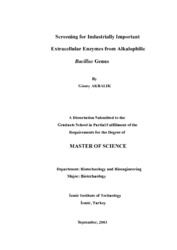Please use this identifier to cite or link to this item:
https://hdl.handle.net/11147/3735Full metadata record
| DC Field | Value | Language |
|---|---|---|
| dc.contributor.advisor | Yenidünya, Ali Fazıl | - |
| dc.contributor.author | Akbalık, Güney | - |
| dc.date.accessioned | 2014-07-22T13:52:15Z | - |
| dc.date.available | 2014-07-22T13:52:15Z | - |
| dc.date.issued | 2003 | - |
| dc.identifier.uri | http://hdl.handle.net/11147/3735 | - |
| dc.description | Thesis (Master)--Izmir Institute of Technology, Biotechnology, Izmir, 2003 | en_US |
| dc.description | Includes bibliographical references (leaves: 65-75) | en_US |
| dc.description | Text in English;Abstract: Turkish and English | en_US |
| dc.description | x, 75 leaves | en_US |
| dc.description.abstract | Alkalophilic Bacillus include industrially important species since they can produce many extracellular enzymes which are active and stable at high pH values.These alkaline enzymes (proteases, amylases, xylanases, cellulases, lipases and pectinases) find use in various field of industry such as leather, detergent, paper industries and waste water treatment.Isolation of diverse bacteria plays an important role in finding novel enzymes with improved characteristics. The aim of this study was therefore to screen for alkaline extracellular enzymes of alkalophilic Bacillus isolated from soil, horse feces and leather processing and to characterize these strains by phenotypic tests and by 16S-ITS rDNA based RFLP.At the end of the study, rod-shaped, endospore forming and Gram positive 116 strains were identified as Bacillus. Ten of the 116 strains were found to be obligate alkalophilic. 91 protease, 77 amylase, 18 xylanase, 3 cellulase, 74 pectinolytic enzyme (71 polygalacturonic acid degrading and 72 pectin degrading) and 55 lipase (41 Tween 20 hydrolyzing and 14 Tween 80 hydrolyzing) producing strains were obtained. Isolated and reference strains were classified into 18 groups in respect of the enzymes they produced.Two enzymes, Taq I and Hae III were used for 16S-ITS rDNA based RFLPanalysis. Both of the enzymes were found to be necessary for the discrimination of the strains. Reference strains were clustered into different groups by both Taq I and Hae III.Taq I digestion revealed 16 genotypic groups while Hae III revealed 15 different groups. And comparative analysis of the RFLP profiles of 116 isolates and 5 reference strains resulted in 26 genotypic groups. | en_US |
| dc.language.iso | en | en_US |
| dc.publisher | Izmir Institute of Technology | en_US |
| dc.rights | info:eu-repo/semantics/openAccess | en_US |
| dc.subject.lcc | TP248.27.M53 A33 2003 | en |
| dc.subject.lcsh | Microbial biotechnology | en |
| dc.subject.lcsh | Bacillus (Bacteria)--Genetics | en |
| dc.subject.lcsh | Alkalophilic microorganisms | en |
| dc.title | Screening for Industrially Important Extracellular Enzymes From Alkalophilic Bacillus Genus | en_US |
| dc.type | Master Thesis | en_US |
| dc.institutionauthor | Akbalık, Güney | - |
| dc.department | Thesis (Master)--İzmir Institute of Technology, Bioengineering | en_US |
| dc.relation.publicationcategory | Tez | en_US |
| dc.identifier.wosquality | N/A | - |
| dc.identifier.scopusquality | N/A | - |
| item.openairetype | Master Thesis | - |
| item.cerifentitytype | Publications | - |
| item.grantfulltext | open | - |
| item.openairecristype | http://purl.org/coar/resource_type/c_18cf | - |
| item.fulltext | With Fulltext | - |
| item.languageiso639-1 | en | - |
| Appears in Collections: | Master Degree / Yüksek Lisans Tezleri | |
Files in This Item:
| File | Description | Size | Format | |
|---|---|---|---|---|
| T000243.pdf | MasterThesis | 672.33 kB | Adobe PDF |  View/Open |
CORE Recommender
Items in GCRIS Repository are protected by copyright, with all rights reserved, unless otherwise indicated.